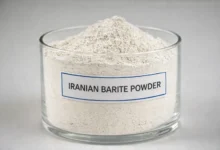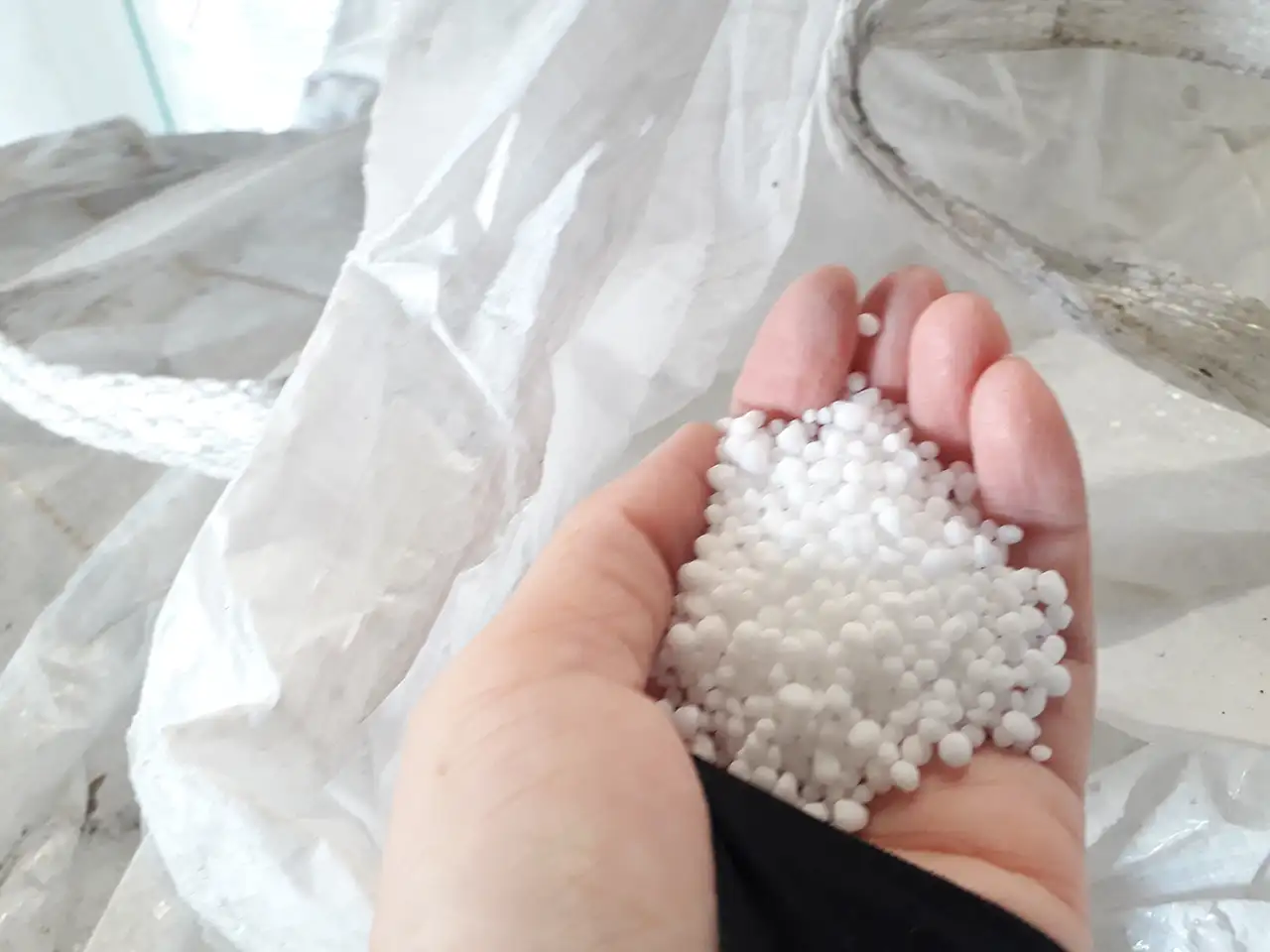Import Bitumen from Iran: Complete 2025 Buyer’s Guide
Essential information for global bitumen importers
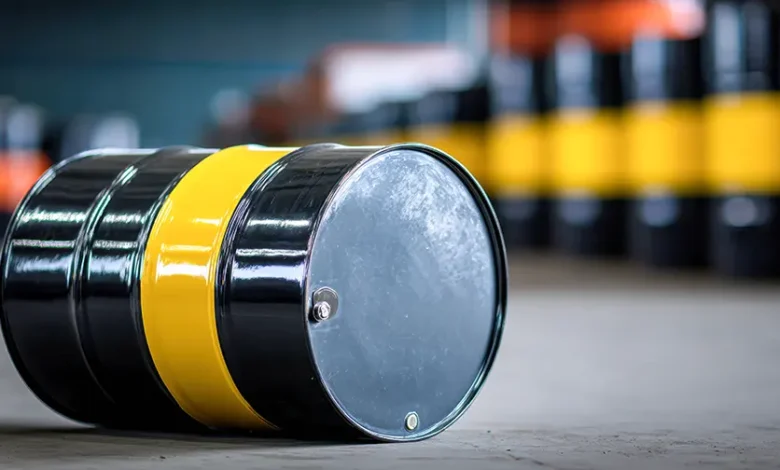
Iran is considered a global leader in bitumen production because it combines massive crude oil reserves, advanced refining technology, and competitive export prices — making it one of the most reliable sources for importers worldwide. (Source: OPEC Annual Statistical Bulletin 2025). We provide comprehensive details on import bitumen from Iran.
With over a decade of consistent export performance, Iran supplies millions of tons of high-quality bitumen (In Persian: قیر) to more than 70 countries each year. Its refineries produce a wide range of grades suitable for diverse climates and road construction standards, positioning the country among the top three global exporters of bitumen.
Why Iran Is a Global Leader in Bitumen Production
Iran’s Production Capacity and Refinery Network
Iran’s bitumen industry is backed by strong infrastructure and large-scale refining capacity. Major producers include Pasargad Oil Company, Jey Oil Refining Co., and Bituco, each certified under ISO and ASTM standards.
| Refinery | Annual Capacity (MT) | Main Grades | Export Destinations |
|---|---|---|---|
| Pasargad Oil | 2,400,000 | 60/70, VG-30, VG-40 | India, China, Africa |
| Jey Oil | 1,800,000 | 40/50, 60/70 | Turkey, Kenya, Malaysia |
| Bituco | 900,000 | Emulsion, Cutback | Middle East, CIS |
Data Source: Iran Ministry of Petroleum, Export Department, 2025
Quick fact: Iran’s total bitumen production exceeds 5 million metric tons per year, ensuring a stable supply chain for both bulk and drum exports.
Comparison with UAE, India, and Bahrain
When comparing Iranian bitumen exports with competitors in the Middle East, Iran stands out for its balance of price, quality, and accessibility.
| Country | Average FOB Price (USD/MT) | Quality Standard | Logistics Access |
|---|---|---|---|
| Iran | 310–340 | ASTM/EN | Excellent (Bandar Abbas, Bushehr) |
| UAE | 360–390 | ASTM | Moderate |
| India | 370–400 | IS Standards | Good |
| Bahrain | 350–380 | ASTM | Limited |
Key insight: Importers who import bitumen from Iran typically save 10–15% on FOB prices without compromising on penetration grade quality (e.g., 60/70 or 80/100).
Key Advantages of Iranian Bitumen
Iranian bitumen is known for consistency, availability, and flexibility in grades and packaging. Below are the main advantages recognized by importers globally:
-
High purity: Consistent refinery control and batch testing.
-
Competitive pricing: Low refinery and feedstock costs.
-
Strategic logistics: Multiple southern ports connected to Asia, Africa, and Europe.
-
Wide grade range: From penetration 40/50 and 60/70 to VG-10, VG-30, and cutback types.
-
Flexible packaging: Drums, jumbo bags, and bulk vessels.
💡 In short, importing bitumen from Iran offers a rare mix of quality, price advantage, and secure logistics — factors that make Iran a trusted global supplier in 2025.
In our experience working with international importers, Iranian bitumen has consistently demonstrated better performance stability and batch consistency compared to suppliers from neighboring countries. Based on importer feedback, the uniform viscosity and purity of grades such as 60/70 and VG-30 reduce the risk of quality complaints and ensure smoother customs clearance due to reliable documentation.
Types and Grades of Iranian Bitumen Explained
Iran produces multiple types and grades of bitumen, including penetration, viscosity, and emulsion forms — each tailored for different climates and construction needs.
This diversity allows global importers to choose the exact specification suitable for their projects, whether for road paving, waterproofing, or industrial applications.
Penetration Grade Bitumen
The most widely exported grades from Iran are 40/50, 60/70, and 80/100, used primarily in road construction and asphalt paving.
These grades are produced according to ASTM D5 and D36 standards.
| Grade | Penetration (0.1 mm) | Softening Point (°C) | Typical Use |
|---|---|---|---|
| 40/50 | 40–50 | 52–60 | Hot climates, heavy traffic roads |
| 60/70 | 60–70 | 49–56 | Moderate climates (most common) |
| 80/100 | 80–100 | 45–52 | Cold climates, flexible pavements |
Fact: Around 70% of Iran’s total bitumen exports belong to penetration grade 60/70, due to its balance of strength and workability.
(Source: OPEC ASB 2025; Jey Oil Refining Co. Technical Data Sheet)Viscosity Grade (VG) Bitumen
Iran also produces VG-10, VG-30, and VG-40 grades compliant with IS 73:2013 standards.
These grades are preferred for tropical countries because they maintain viscosity across temperature variations.
| Viscosity Grade | Kinematic Viscosity @135°C (cSt) | Applications |
|---|---|---|
| VG-10 | 800–1200 | Cold regions, surface dressing |
| VG-30 | 2400–3600 | Heavy traffic, highways |
| VG-40 | 3200–4800 | Industrial paving, airports |
Cutback and Emulsion Bitumen
For specific applications like surface sealing, waterproofing, or dust control, Iran exports MC-30, RC-70, and cationic emulsions (CRS-1, CSS-1).
They are ideal for cold mix asphalt or where heating is not feasible.
Advantages of Iranian cutback/emulsion bitumen:
-
Lower environmental impact
-
Ready-to-use liquid form
-
High adhesion on wet aggregates
(Sources: Iran Ministry of Petroleum, Refinery Division 2025; ASTM D2397 Standard)
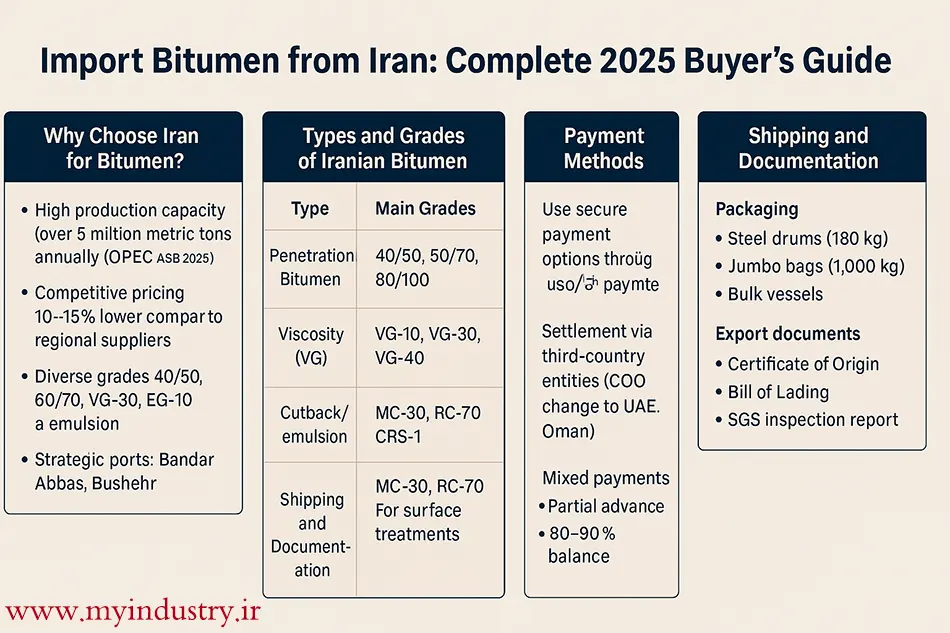
Certification and Quality Control
All major Iranian refineries perform testing based on ASTM, EN 12591, and ISO 2909 standards.
Each export batch typically includes:
-
Certificate of Analysis (COA)
-
SGS or Intertek third-party inspection report
-
Product Data Sheet (PDS)
Quick Summary:
Iran’s wide variety of bitumen grades ensures importers can find both standard penetration types and specialized viscosity or emulsion products at globally competitive prices.
How to Verify a Reliable Iranian Bitumen Supplier
To verify a reliable bitumen supplier in Iran, importers should check company registration, export licenses, third-party certifications, and references from previous international buyers.
This step is critical to avoid scams, overpricing, or inconsistent product quality.
Verify Legal Registration and Export License
Reputable suppliers are registered with the Iran Chamber of Commerce and licensed by the Ministry of Petroleum Export Department.
Always ask for:
-
Business registration certificate (شماره ثبت)
-
Export license (کارت بازرگانی)
-
Tax identification number (TIN)
(Source: Iran Chamber of Commerce – Exporter Verification Portal 2025)
Review Product Certifications and Testing Reports
Reliable exporters provide full documentation for each shipment:
-
Certificate of Origin (COO)
-
SGS / Intertek inspection report
-
ASTM D5/D36 compliance test results
-
Batch traceability number
Tip: Suppliers who provide a pre-shipment SGS inspection report generally demonstrate higher reliability and transparency.
Check Business Reputation and References
Before placing an order, importers should verify credibility through:
-
Trade directories (e.g., Alibaba Verified Exporters, IranTrade.gov)
-
Reference letters from previous international clients
-
Online feedback or Google Business profile consistency
Red flags to avoid:
-
Suppliers offering prices far below market rate
-
Missing address or domain without SSL certificate
-
Refusal to issue official proforma invoices
Use Secure Payment and Shipping Terms
Use internationally recognized Incoterms 2025 and secure payment methods:
-
T/T (Telegraphic Transfer) for small orders
-
Letter of Credit (L/C) for large contracts
-
Escrow or third-party payment services for first-time transactions
Preferred Shipping Terms:
| Term | Risk Level (Importer) | Common Use |
|---|---|---|
| FOB (Bandar Abbas) | Moderate | Most standard contracts |
| CIF (Port of Destination) | Low | Buyers prefer for full logistics coverage |
| CFR | Medium | Good for established suppliers |
(References: ICC Incoterms 2025; Iran Freight Forwarders Association)
A verified Iranian bitumen supplier must hold official export licenses, provide SGS inspection reports, and comply with ASTM standards. Always check registration with the Iran Chamber of Commerce and use secure payment terms (L/C or T/T) to ensure a safe transaction.
Step-by-Step Bitumen Import Process from Iran
To import bitumen from Iran, buyers must follow a structured process that includes supplier verification, contract signing, payment confirmation, and export documentation before shipment.
This process ensures transparency, compliance with international trade laws, and delivery of certified Iranian bitumen.
Request for Quotation (RFQ) and Price Negotiation
Start by contacting verified Iranian bitumen exporters with your required grade (e.g., 60/70 or VG-30), packaging type (drum or bulk), and destination port.
Suppliers will issue a quotation with FOB or CIF pricing based on your request.
It’s best to compare at least three offers to confirm market price consistency.
(Source: Iran Trade Promotion Organization, Export Procedures 2025)
Proforma Invoice and Contract
Once terms are agreed, the supplier issues a Proforma Invoice detailing product grade, price per ton, HS code, and shipping terms.
Both parties should then sign a Sales Contract under ICC Incoterms 2025 conditions.
Recommended clauses include:
-
SGS or Intertek inspection required before loading
-
Delivery time and demurrage terms
-
Payment and arbitration clause (ICC Paris or Tehran Chamber)
Payment Methods in Bitumen Trade with Iran
Due to ongoing financial restrictions, most international buyers of Iranian bitumen use indirect yet legitimate payment channels such as third-country exchanges, trusted brokerage systems, or non-Iranian currency settlements.
While international banking remains limited, there are still secure and traceable methods that comply with trade transparency and minimize transaction risk.
Using Non-Iranian Exchange Offices (Currency Brokers)
Most importers handle payments through licensed exchange houses (money service businesses) based in countries such as the UAE, Turkey, or Oman.
These offices act as intermediaries to receive payment in USD, AED, or EUR, and then transfer equivalent funds to the Iranian exporter’s domestic bank in rials.
Typical process:
-
Buyer deposits the amount in the broker’s foreign account.
-
The broker issues a transaction receipt and notifies both parties.
-
The exporter confirms receipt in Iran before releasing the cargo.
Advantages:
-
Fast and widely accepted among Iranian exporters.
-
Avoids delays from international SWIFT restrictions.
-
Supports both small and bulk shipments.
Precaution: Always use registered, reputable brokers with verifiable business licenses or trade references.
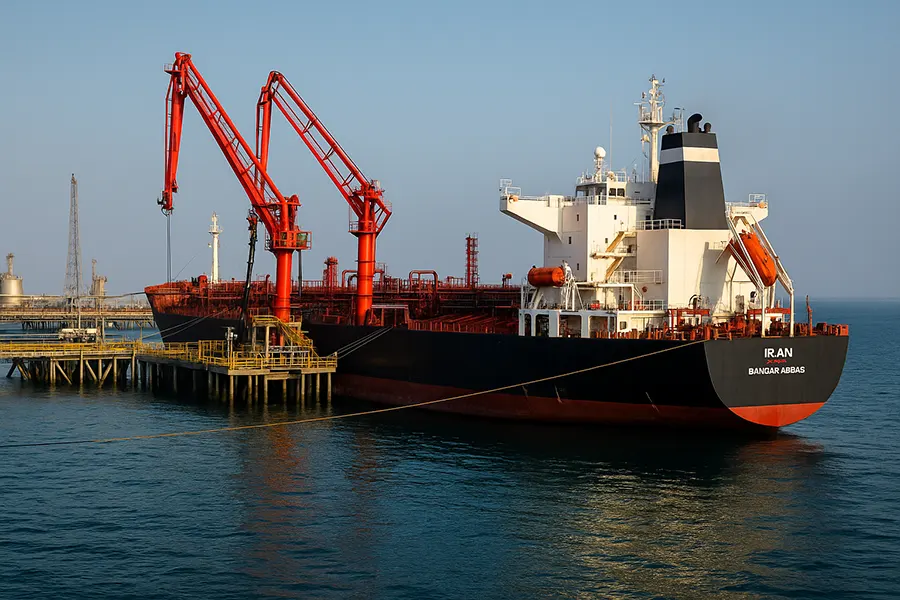
Settlement via Third-Country Entities
Some international traders purchase bitumen through intermediaries registered outside Iran, such as in the UAE, Oman, or Malaysia, where the goods are first re-exported.
In such arrangements, the shipment’s Certificate of Origin (COO) may legally indicate the intermediary country, provided local re-export laws are observed.
How it works:
-
The Iranian exporter sells to a partner company in a third country.
-
That company handles invoicing and payment collection.
-
Goods are shipped from Iranian ports (e.g., Bandar Abbas) to the partner’s storage facility, then onward to the buyer.
Advantages:
-
Simplifies banking and customs documentation.
-
Enables payment via standard L/C or T/T through the intermediary.
Note: Importers should ensure full transparency in contracts and maintain proof of product origin and inspection reports to comply with domestic import regulations.
Mixed or Escrow-Based Payment Arrangements
In some cases, payments are split into two stages:
-
Partial advance (10–20%) via foreign broker or exchange office, to confirm the order.
-
Balance (80–90%) released after third-party inspection (SGS or Intertek) and submission of Bill of Lading copies.
This hybrid system is now the most commonly used structure for Iranian bitumen exports in 2025.
It balances security for both sides—buyers can verify shipment before full payment, and exporters receive assurance to proceed with loading.
Currency and Documentation Practices
Although USD remains the reference pricing unit, most actual settlements occur in AED, EUR, or CNY through third-party financial hubs.
Supporting documents such as Proforma Invoice, Commercial Invoice, and Inspection Certificate are still issued in English and compliant with Incoterms 2025 standards.
Export Documentation and HS Codes
Iranian exporters must provide these documents for customs clearance:
-
Commercial Invoice
-
Packing List
-
Certificate of Origin (Iran Chamber of Commerce)
-
SGS / Intertek Inspection Report
-
Bill of Lading (B/L)
-
HS Code: 27132000 (Petroleum Bitumen)
Packaging, Loading, and Shipment
Iranian refineries offer multiple packaging options depending on shipment size.
| Packaging Type | Capacity | Use Case |
|---|---|---|
| New Steel Drum (180 kg) | ~1 MT = 5–6 drums | Standard export packaging |
| Jumbo Bag (1 MT) | 1 MT = 1 bag | Cost-effective alternative |
| Bitutainer / Bulk Vessel | ≥ 1,000 MT | Large-scale industrial buyers |
Most exports are shipped via Bandar Abbas, Bushehr, or Bandar Imam Khomeini ports.
(References: Iran Customs Administration 2025; ICC Incoterms 2025)
To import bitumen from Iran, verify suppliers, sign a contract under ICC Incoterms 2025, use secure payment (L/C or T/T), and obtain SGS-certified export documents including HS Code 27132000 before shipment.
Bitumen Price Trends and Export Statistics (2025 Update)
Iranian bitumen prices in 2025 remain among the most competitive globally, averaging USD 310–340 per metric ton (FOB Bandar Abbas), driven by stable crude supply and efficient refining.
Despite global fluctuations, Iran has maintained strong export growth due to steady demand from Asia and Africa.
Current Price Range and Comparison (Q3 2025)
| Origin Country | Average FOB Price (USD/MT) | Main Grades Exported |
|---|---|---|
| Iran | 310–340 | 60/70, VG-30, VG-40 |
| UAE | 360–390 | 60/70, 80/100 |
| India | 370–400 | VG-10, VG-30 |
| Bahrain | 350–380 | 60/70 |
(Sources: TradingEconomics 2025; IndexBox Market Outlook 2025)
Iranian bitumen remains 10–15 % cheaper than regional competitors while meeting ASTM and EN standards.
Seasonal Price Fluctuations
Prices are typically lowest between December and February due to reduced road-paving demand and highest between May and August during construction season.
Key factors affecting price:
-
Global crude oil benchmark (Brent)
-
Domestic refinery capacity utilization
-
Shipping costs and container availability
-
Regional demand in India, China, and East Africa
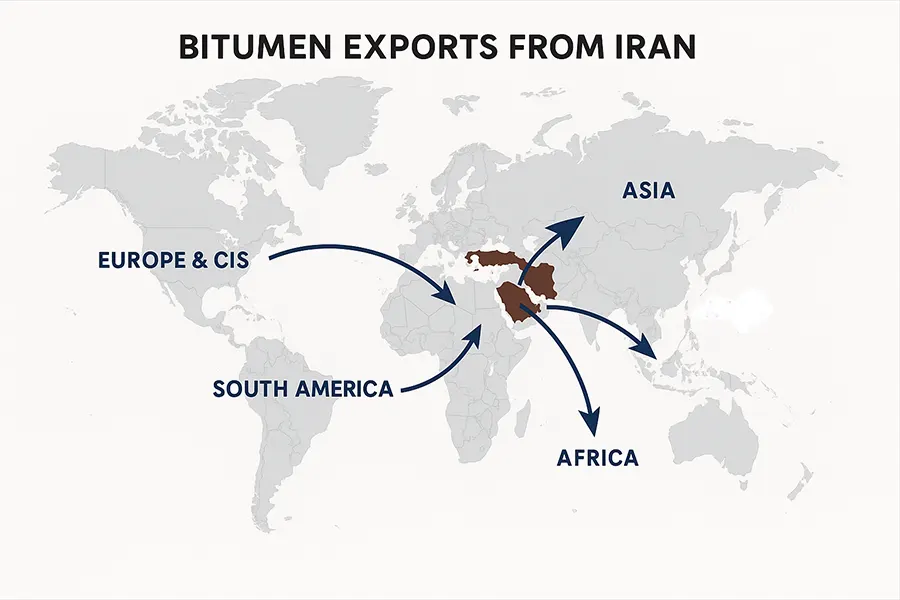
Export Volumes and Destinations
Iran exports roughly 4.5–5 million metric tons of bitumen annually, ranking among the top three exporters worldwide.
| Destination Region | Share of Exports (%) | Top Importing Countries |
|---|---|---|
| Asia | 45 % | India, China, Malaysia |
| Africa | 30 % | Kenya, Tanzania, South Africa |
| Middle East | 15 % | UAE, Oman, Qatar |
| Europe & CIS | 10 % | Turkey, Georgia, Armenia |
(Data Source: OPEC ASB 2025; UN Comtrade 2024)
Market Outlook for 2026
Analysts forecast steady growth in bitumen demand at 4.2 % CAGR through 2028, driven by:
-
Urban infrastructure projects in Asia and Africa
-
Expansion of industrial waterproofing markets
-
Increase in public road maintenance budgets
Iran’s bitumen prices in 2025 average USD 310–340 per MT (FOB), about 15 % lower than UAE or India. Annual exports reach nearly 5 million tons, mainly to Asia and Africa, supported by stable refinery output and competitive logistics.
Shipping, Packaging, and Ports of Export
Iran exports bitumen mainly through its southern ports—Bandar Abbas, Bushehr, and Bandar Imam Khomeini—using drums, jumbo bags, or bulk tankers, depending on buyer requirements.
Each shipment is tested, sealed, and accompanied by SGS or Intertek inspection certificates to ensure product quality and origin authenticity.
Packaging Options
| Packaging Type | Weight per Unit | Typical Buyers | Advantages |
|---|---|---|---|
| New Steel Drum | 180–200 kg | Distributors, contractors | Safe handling, global standard |
| Jumbo Bag (1 MT) | 1000 kg | Bulk importers | Lower packaging cost, recyclable |
| Bitutainer / Flexitank | 20–25 MT | Industrial projects | Ideal for long-distance, bulk shipment |
| Bulk Vessel Shipment | ≥ 1,000 MT | State tenders, large buyers | Economical per ton |
Quality control before loading includes:
-
Weighbridge certification
-
Temperature and viscosity measurement
-
Visual inspection for leaks or contamination
(Source: Iran Customs Administration 2025; Jey Oil Refining Co. Export Manual)
Main Export Ports
1. Bandar Abbas Port – Primary export hub, connected to rail and road networks; handles > 60 % of bitumen exports. (Import bitumen from Iran)
2. Bushehr Port – Preferred for buyers in GCC and North Africa.
3. Bandar Imam Khomeini Port – Suitable for bulk tanker vessels and re-exports to Asia.
In short, Iranian exporters provide flexible shipping options from multiple ports, ensuring global reach and cost-efficient logistics.
Legal and Sanction Considerations
Importing bitumen from Iran remains legally possible under international trade laws when conducted transparently, through compliant intermediaries, and with full documentation of product origin and inspection.
While U.S. and certain EU restrictions apply, most countries in Asia, Africa, and the Middle East maintain open channels for petroleum-based commodities.
Practical Compliance Approach
-
Use licensed third-country intermediaries (e.g., UAE, Oman, Malaysia) for invoicing and payment.
-
Ensure Certificate of Origin and SGS inspection reports accompany each shipment.
-
Keep contracts under ICC Incoterms 2025 with transparent clauses on delivery, inspection, and arbitration.
-
Avoid falsified documents; instead, rely on re-export certification from intermediary customs when applicable.
Due Diligence for Importers
Before finalizing any purchase:
-
Verify the exporter’s registration with Iran Chamber of Commerce.
-
Confirm that inspection certificates (SGS/Intertek) reference Iranian refinery codes.
-
Retain full communication records and inspection reports for customs compliance in your country.
(References: UN Comtrade 2024; ICC Trade Compliance Guide 2025)
Importing Iranian bitumen is feasible when handled through licensed intermediaries, accompanied by valid origin certificates, and documented under ICC Incoterms 2025. Transparency and verified inspection reports remain the key compliance factors.
FAQs – Everything Importers Ask About Iranian Bitumen
These are the most common questions from international buyers interested in importing bitumen from Iran.
Q1: How can I import bitumen from Iran safely?
A: Work with verified exporters, use partial pre-payment via reputable foreign exchange offices, and require SGS inspection before final payment.
Q2: Which bitumen grades are most popular for export?
A: Penetration 60/70 and VG-30 are the most demanded grades, suitable for tropical and moderate climates.
Q3: Can I import Iranian bitumen if my country has no direct banking access?
A: Yes. Use trusted exchange houses or third-country partners to settle payments in AED or EUR while maintaining full documentation.
Q4: What documents are required for customs clearance?
A: Commercial Invoice, Packing List, Certificate of Origin, SGS Report, Bill of Lading, and HS Code 27132000.
Q5: Which ports are most efficient for shipment?
A: Bandar Abbas is the main export port due to its modern terminals and high container turnover.
Conclusion – Start Your Bitumen Import from Iran Today
Iran’s bitumen industry offers a unique combination of quality, competitive pricing, and dependable supply routes—making it one of the most attractive sources for global importers.
With transparent documentation, trusted intermediaries, and proper inspection, importing bitumen from Iran can be a secure and profitable long-term partnership. (read more: Granular Urea)
Begin your sourcing plan today—request verified quotations, confirm refinery certificates, and join the growing network of international buyers who trust Iranian bitumen for their infrastructure projects.


